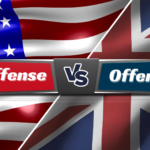The choice between “defence” and “defense” depends on your adherence to British or American English. In British English, use “defence,” while in American English, use “defense.” Mnemonic devices, like associating “c” with “commonwealth” for British English, can aid in remembering the difference.
What’s The Difference Between Defence and Defense?
The difference between defence and defense is that defence is the preferred spelling in British English, while defense is the preferred spelling in American English. Both words have the same meaning and pronunciation, but they differ in their spelling conventions.
Here is a table for better understanding the difference:
| British English | American English |
|---|---|
| Defence | Defense |
| Defenceless | Defenseless |
| Defenceman | Defenseman |
| Defencive | Defensive |
As you can see, the British spelling retains the c in all forms of the word, while the American spelling changes the c to an s. However, there is one exception: when the suffix added to the word begins with an i, both British and American English use the s spelling. For example:
- He was added to the team because of his strong defensive performance.
- The platoon had to move to a more easily defensible position.
How to Remember the Difference Between Defence and Defense?
One way to remember the difference between defence and defense is to use a mnemonic device based on the spelling of the words. For example, you can think of the c in defence as standing for “commonwealth”, which refers to the group of countries that were formerly part of the British Empire. On the other hand, you can think of the s in defense as standing for “states”, which refers to the United States of America.
Another way to remember the difference between defence and defense is to use a spelling checker tool that can detect the variety of English you are using and suggest the appropriate spelling for your word.
How “Defence or Defense” can be Used as a Noun, Verb, or Adjective?
As a noun, “defence” or “defense” can refer to the act of protecting or guarding against harm, the legal plea of a person on trial for a crime, or a sports position intended to prevent an opponent from scoring.
For example:
- The army was ready to mount a defence against the invaders.
- The lawyer presented a strong defense for his client.
- He plays defense for the hockey team.
As a verb, “defense” can mean to protect or guard against something, especially in sports. This usage is more common in American English and is considered incorrect by some style guides.
For example:
- The team defended their title with a convincing win.
- He defended the ball from the other player.
- The team defenses the opponent’s advance. (Incorrect)
As an adjective, “defence” or “defense” can modify a noun to indicate that it is related to protection or guarding.
For example:
- The defence minister announced a new policy.
- The defense budget was increased by 10%.
- He was added to the team because of his strong defensive performance.
Examples of Defence and Defense in Sentences
Here are some examples of how to use defence and defense in sentences, according to the variety of English you are following:
- British English: There’s no defence that could have stopped that attack.
- American English: The team needs to sustain its defense no matter who it is facing.
- British English: Centre-back Joel Matip’s return is set to bring a calming influence to Liverpool’s defence but manager Jurgen Klopp has tried to deflect attention away from the 25-year-old.
- American English: Fowler, who struggled defensively early in his career, played spectacular defense with the Cubs, after he started playing deeper.
Conclusion
Defence and defense are two different spellings of the same word that means “protection” or “something that guards against harm”. The defence spelling is more common in British English, while the defense spelling is more common in American English. To avoid confusion, you should follow the spelling conventions of the variety of English you are using and check your spelling with a tool if you are unsure.


